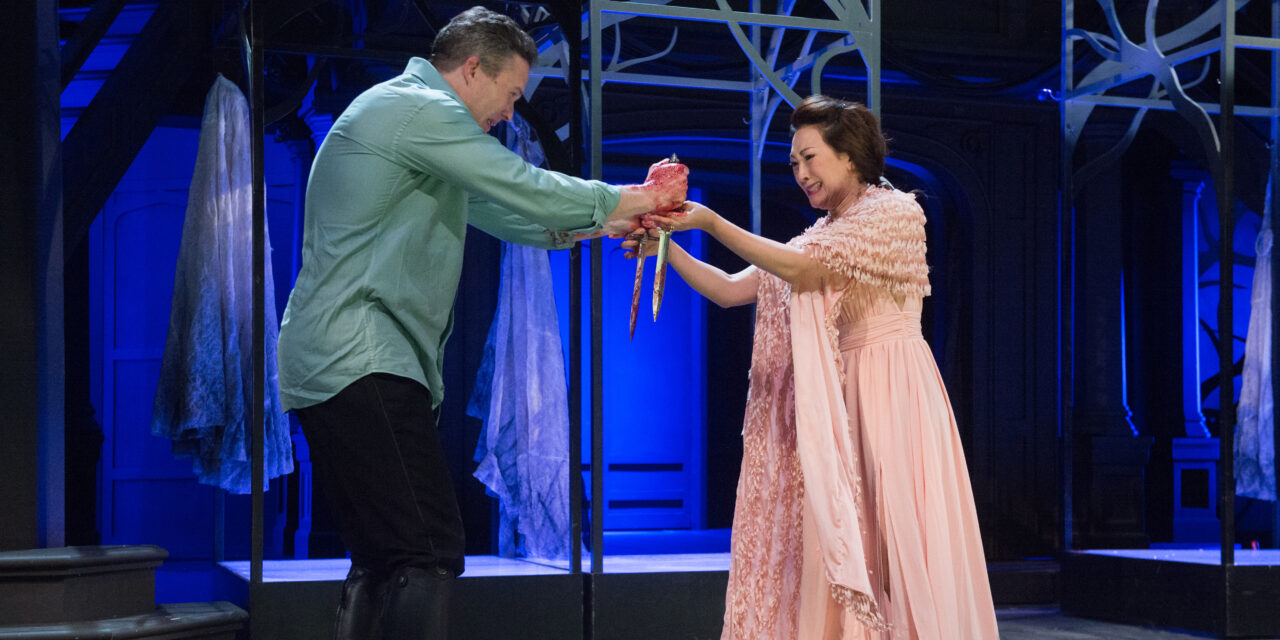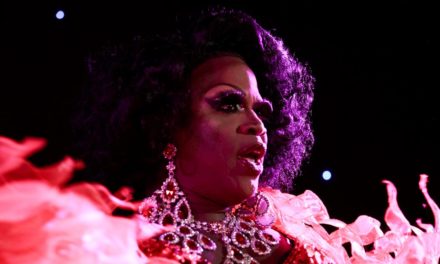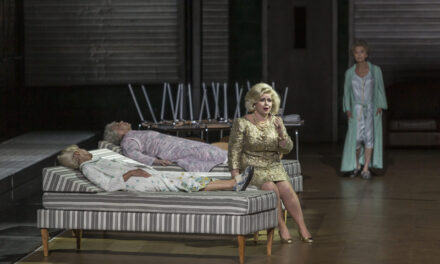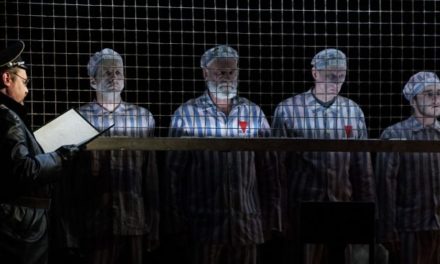“They [the Macbeths] have many attributes that we all share in contemporary society, including ambition and the desire to have a seat at the table,” director José Luis Valenzuela writes in his program note for the Oregon Shakespeare Festival’s production of Macbeth. In this production, Valenzuela highlights how we, too, can relate to the Macbeths and how we, too, may betray our own sense of morality. He makes the production sexy and violent, magical and realistic, heartbreaking and repulsive. His Macbeths are, at times, less like villains and more like fallen heroes, urging the audience to ask themselves “What will we do if we ever acquire power: Will we be corrupted by it, or will we be able to hold on to our dignity and keep our friendships?”
Macbeth is an admired Scottish general whose fate changes after an encounter with three prophetic witches. They tell him that he will become king of Scotland but that the descendants of Banquo, his friend and fellow soldier, will ultimately inherit the throne. This prophecy blinds Macbeth with ambition and sends him on a trajectory that involves murder and tyranny. Macbeth tells his wife, Lady Macbeth, of the witches’ prophecy, and together they successfully conspire to kill Duncan, the current king, allowing Macbeth to ascend to the throne. Although he has achieved the status that the prophecy foretold, he is uneasy about the detail regarding Banquo’s children. As a result, he orders that Banquo and his son be killed. Banquo dies, but his son narrowly escapes. Visited again by the witches and hearing more strange prophecies, Macbeth has the family of another royal leader, Macduff, killed. Fueled by grief and revenge, Macduff sets the English Army on a warpath to destroy Macbeth. Lady Macbeth, previously more cold-blooded than her husband, is now guilt-ridden over their crimes. In one particularly haunting scene, she begins sleepwalking and attempts to wash her hands of her guilt. Ultimately, she commits suicide. Macduff’s army advances, leading to a duel between him and Macbeth. The tragedy climaxes in Macduff’s gruesome beheading of Macbeth. Malcolm, the son of Duncan, is crowned king and promises to rule as a benevolent leader.
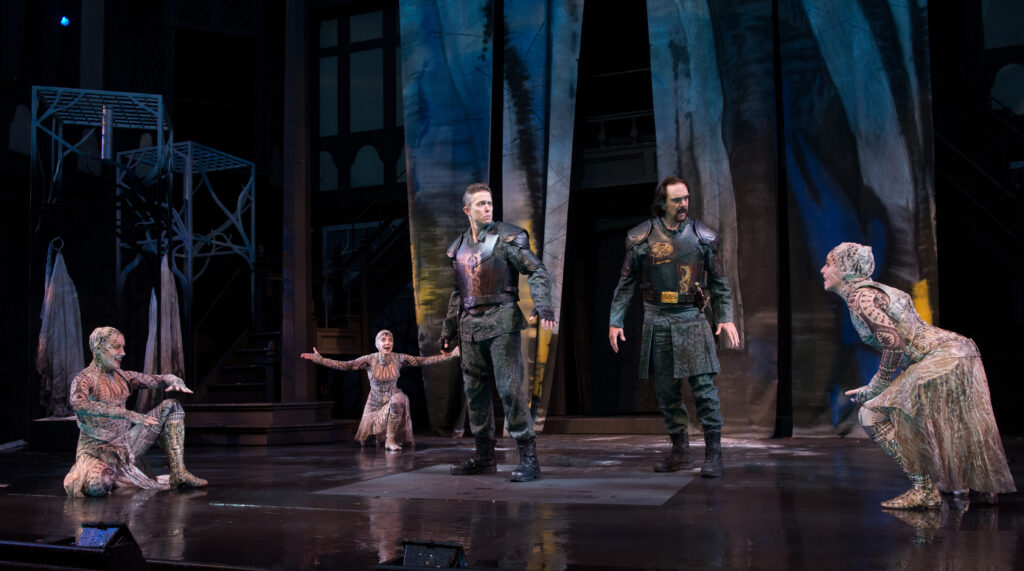
The Oregon Shakespeare Festival. 2019. Macbeth by William Shakespeare. Directed by José Luis Valenzuela. Photo: Jenny Graham.
In the Allen Elizabethan Theatre, the audience is united with the natural world and that of the stage for this production of Macbeth. When the play begins, it’s still bright summer night, and, like the Macbeths, we too descend into darkness. Valenzuela introduces us to the darkness quickly with the staging of a child’s funeral. A tiny white coffin is laid center stage, and a chorus of mourners emerge from the aisles of the house. We see the stoic Lady Macbeth (Amy Kim Waschke), veiled in black lace, and her husband, Macbeth (Danforth Comins), who is visibly tortured by the scene. We are now given motivation for the Macbeths’ ruthless quest for power and how they might be able to forgo any moral compass they seemed to have once had.
With this preface, we can see how the Macbeths might have made the pivot from heroes to villains. In the face of such a deep loss, the love and tenderness they once had turned into cold grief. The audience can see how they might want revenge against an unfair world and how a lust for prestige and power could be an attractive replacement for familial love. We first see this concession through subtle blocking in the play. When Macbeth and Lady Macbeth make a plan to go after the kingship and murder Duncan, there is a highly choreographed sex scene where Macbeth kisses Lady Macbeth’s stomach, suggesting that their child – their purpose and their future – is being replaced with violence and power. Lady Macbeth’s body, once a vessel for creation, and is now transitioning into a vessel for destruction.
Although beautifully staged, the initial sex scene lacks the erotic and intoxicating combination of power and sex that it seems to want to suggest. It has an acrobatic feel; it’s graceful and precise in a way that feels at odds with the dramatic red lighting and lacy white lingerie that these elements, coupled with the dialogue, seem to suggest – something more raw and primal – and falls short.
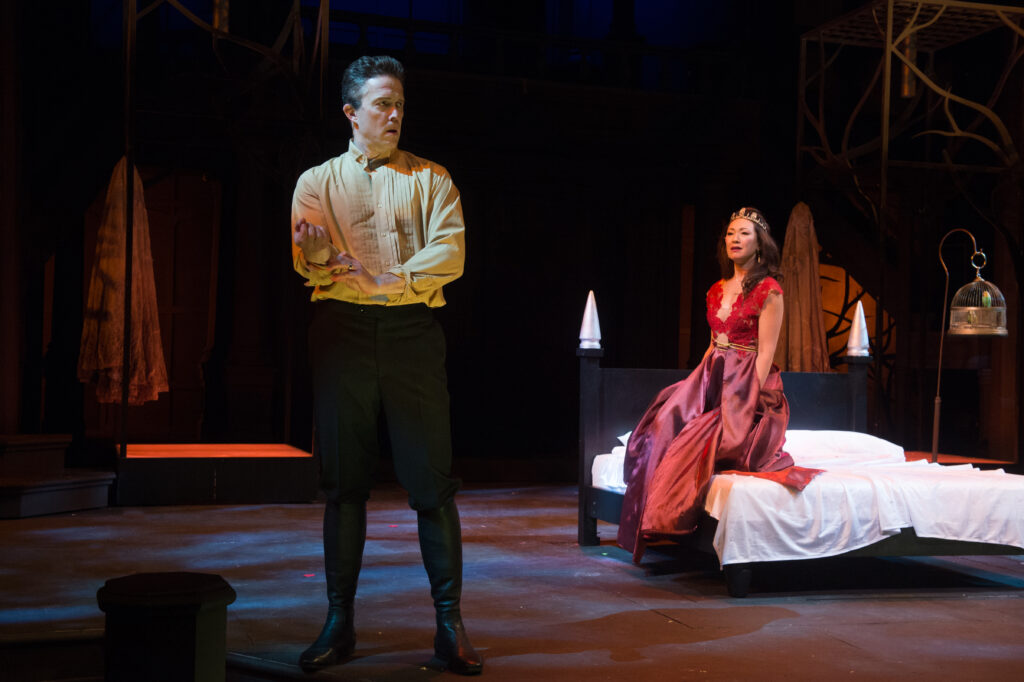
The Oregon Shakespeare Festival. 2019. Macbeth by William Shakespeare. Directed by José Luis Valenzuela. Photo: Jenny Graham.
Lady Macbeth also feels muted during her “Unsex me here” monologue, where she calls upon the spiritual world to take away her femaleness, her maternal instinct, so that she may have the ability to murder and obtain the power she seeks. This scene should strike the audience as particularly powerful and poignant, as now we have the backstory that she has lost a child, but it doesn’t. Waschke’s range as an actor is showcased far better during the dinner where Banquo’s (Al Espinosa) ghost appears, and later when her guilt causes her to sleepwalk. In the dinner scene, she just both save face for her dinner guests and talk down a hysterical Macbeth, which she does with energy and urgency that we haven’t seen yet. It’s painful but entertaining to see how she alternates between these roles. Later in the play, when she begins to crumble with guilt, we get a clear sense of how isolated she now is and the price of the ruthlessness that she once asked for. She’s fragile and unhinged, already spectral to the audience.
For his part, Macbeth seems to go from hesitant participant to committed murderer between scenes, making for a disjointed transition around Duncan’s murder. He does, however, evolve with such skill from this point on that one can forgive this initially rough transition. From the very beginning, Comins shows off the range of emotion that he can portray in his face and body, even without words. Right from the initial funeral scene, his face stands out as extremely flexible and easy to read, even from a distance. Once crumpled with grief, his face later becomes grey and gaunt, with bulging eyes and an insatiable hunger for power. We see that although he has more political power, he is wasting away with madness, paranoia, and perhaps grief over the death of Lady Macbeth. His body becomes a vessel for witches, much like Lady Macbeth’s did, during the scene at the top of Act 4: “Double, double toil and trouble; Fire burn, and cauldron bubble.” Instead of circling around a bubbling cauldron, the witches have surrounded Macbeth’s body in a bathtub. Blessing, cursing or imbuing him with the powers of the ingredients described.
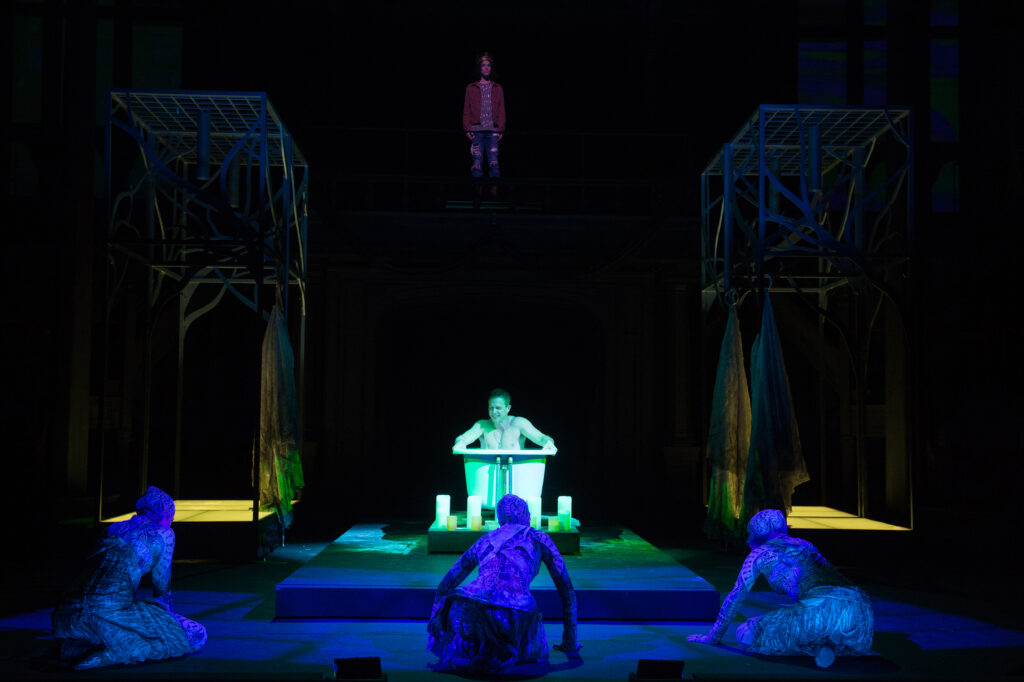
The Oregon Shakespeare Festival. 2019. Macbeth by William Shakespeare. Directed by José Luis Valenzuela. Photo: Jenny Graham.
The witches (Robin Goodrin Nordli, Miriam A. Laube, Erica Sullivan) are the catalyzing, supernatural forces at the edges of the play. They are often present in set pieces (scenic design by Christopher Acebo) that look like pillars of stylized trees, and notably appeared at the top of the play during the child’s funeral. The witches’ supernatural features are played up as they become almost sexless in their textured grey bodysuits. They also carry a versatile fabric that acts as a veil, a shawl, and an extension of their bodies. It looks a bit like a spider’s web, giving the witches a decidedly creepy presence. The witches use breath, sound, and dance to add to their otherworldly presence. Throughout the play they double as chambermaids and as various servants, giving the audience an awareness of the prophecy that hangs over the characters’ choices and the events of the play in a way that creates constant anxiety for the audience.
Lighting (designed by Pablo Santiago) and costumes (designed by Chrisi Karvonides-Dushenko) also play an important role in creating a contemporary visual palette. We see it perhaps most clearly in Lady Macbeth’s costumes, where there is a direct relationship between her sexuality and her power. She is often wearing richly colored, elegant fabrics that show her rise in status and wealth. They also reveal more of her body than the clothing of the other women in the play. Through costuming, there is an insinuation that there is both power and danger in women’s sexuality.
For a play concerned with so much inner darkness, it may come as a surprise that the lighting features so much color. The scheme follows the coding that many would be familiar with (red for passionate scenes, white for grief, green for jealousy) and adds familiar but riveting psychology to the play. Most notably, the lighting for the scene where the ghost of Banquo appears at the Macbeths’ banquet is green. The putrid color adds to the specter and to Macbeth’s rising paranoia and his need for control.
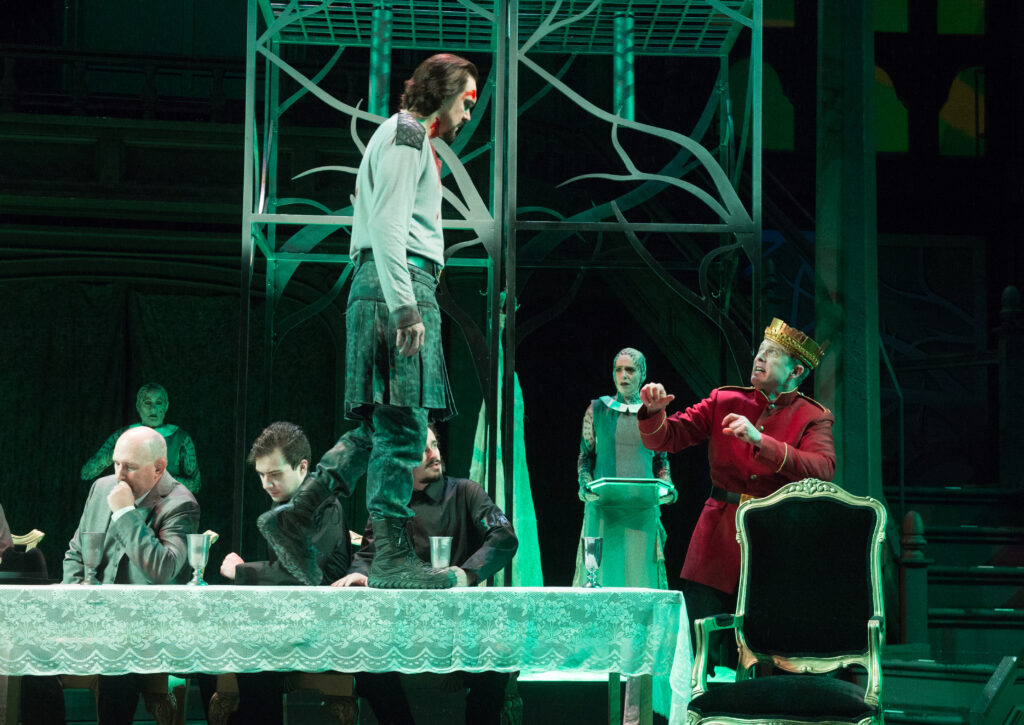
The Oregon Shakespeare Festival. 2019. Macbeth by William Shakespeare. Directed by José Luis Valenzuela. Photo: Jenny Graham.
Valenzuela never shies away from portraying overt violence in his iteration of Macbeth. When Macduff’s wife is murdered, for example, we see her pregnant belly slit open and a baby pulled out, capitalizing again on the idea of the body as a vessel and what we hold there: the potential for either good or bad. The beheading of Macbeth also happens onstage, with Macduff (Chris Butler) triumphantly holding up a very realistic head as a sign of victory of good over evil. It can be difficult to watch as an audience member, but it doesn’t feel gratuitous. Each visual act of violence emotionally echoes the rawness of the initial scene – the mourning family, the tiny casket – and creates a through-line that makes more plausible the desire for power and revenge over the immutable facts of life. How the relationship between life and death, parents and children, body and spirit is staged also sets up the audience to see the symmetry in the final scene, where Macbeth realizes that Macduff is in fact “not from a woman born.”
This tragedy speaks to our modern relationship to power, love, sex, and ambition by adding to the preface of the play with the loss of a child and by showing explicit violence and sexuality. It asks us to examine our relationship to cultural norms and values, the biases we hold in our minds, and the trauma we hold in our bodies. Who are we, and who do we have the capacity of being if left unchecked?
Macbeth is at the Oregon Shakespeare Festival in the Allen Elizabethan Theatre through October 11, 2019.
This post was written by the author in their personal capacity.The opinions expressed in this article are the author’s own and do not reflect the view of The Theatre Times, their staff or collaborators.
This post was written by Taylor L. Ciambra.
The views expressed here belong to the author and do not necessarily reflect our views and opinions.

